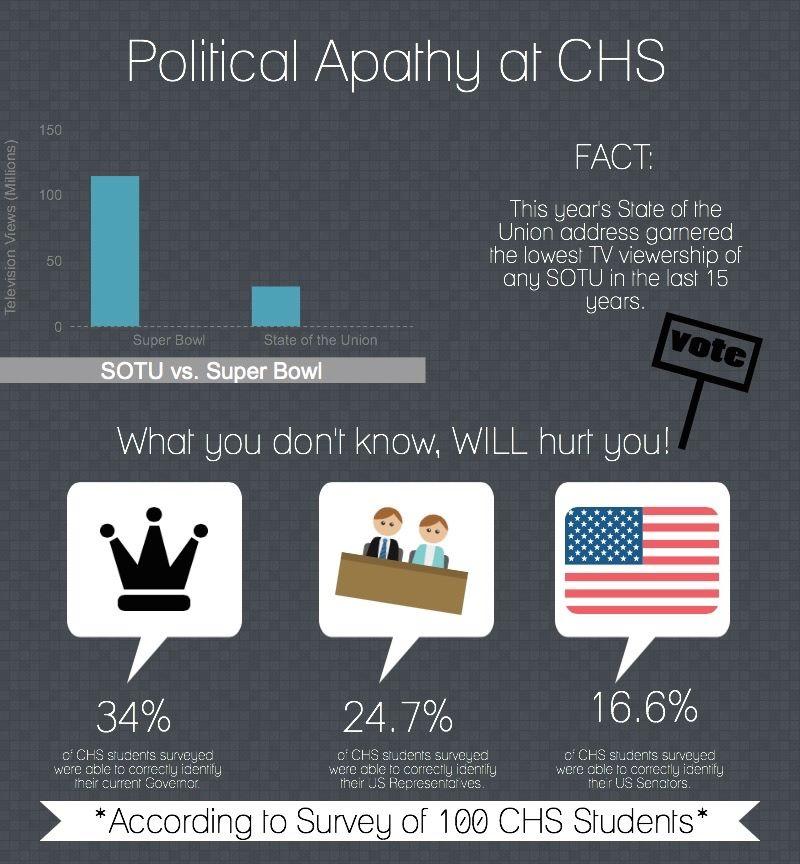The Founding Fathers cared: why shouldn’t we?
February 27, 2015
Over 31 million people from around the nation tuned in Jan. 20 to watch President Barack Obama deliver his annual State of the Union (SOTU) address to a joint session of Congress. Last year, the combined viewership of The Voice and Dancing with the Stars averaged 30.2 million viewers per show, according to TV Guide, and the similarity is indicative of a somber truth.
The American people simply do not seem to care much for politics-or at least not more than they care about televised musical competitions featuring Blake Shelton and Lolo Jones–and nowhere is this trend more apparent than at CHS.
According to a recent Observer poll of over 100 CHS students, just under 50 percent tuned in to watch the President’s speech. Furthermore, of those who were polled, approximately 66 percent could not name our current Governor and less than one in four were able to name our Representative and Senators in Congress.
According to a Jan. 21 Wall Street Journal article, this year’s SOTU drew the lowest TV viewership in 15 years. While there are many reasons for why this year’s speech garnered a lower viewership than previous years, a decreased interest in politics may have led some Americans to skip the SOTU.
At CHS, where viewership was considerably low, this political disinterest certainly appears to be the reason why many opted to not watch the President’s speech.
Even more disturbing than the lack of political interest revealed by the poll are the reasons that were given by those who are apathetic about their government.
Some of those polled claimed that they had no interest in watching the SOTU because “Netflix is more fun.” Regarding who our current Governor is, one CHS student incorrectly guessed “O’Brien,” while another simply responded with “Honestly, I don’t know, man.”
While not knowing a Governor’s name may not seem all that important, the general lack of political awareness among the youngest and brightest of our community is a pressing problem.
After all, we live in a republic, and those ‘distant, out-of-mind’ politicians are the ones who make decisions that have a direct impact on our daily lives.
Decisions made by government officials determine everything from which textbooks we read, to the best strategy for preventing terrorist attacks, to the toxicity of the air we breathe. The SOTU is the one time of the year where the President and Congress meet to detail some of the most pressing national issues in an accessible and straightforward way for voters. The fact that some CHS students would rather watch reality TV shows than learn about the state of our nation is not only appalling, but also harmful to all of us.
Over 114 million people tuned in to watch the Patriots play the Seahawks Feb. 1 in the Super Bowl. For every one American who watched the State of the Union, nearly four others watched the game.
And while the people of Maryland will never bet money on the different appropriations which will be enacted in Governor Larry Hogan’s inaugural budget, this legislation will change the lives of many Marylanders. For example, taxes on small businesses will be lowered, sorely needed planned metro lines may be cut, and significant reductions in public health care spending is on the way. Similar political battles happen every year across each of the 50 states.
While the Super Bowl will always be more entertaining than a politician’s speech, it only determines the NFL’s best team, whereas speeches, debates and legislation, taken together, have a direct impact on the lives of every American.
The world we live in is contentious and polarized, but having political views is meaningless if one is not willing to express those views and act on them.
Thomas Jefferson once said, “Wherever the people are well informed, they can be trusted with their own government.” Over 200 years later, his words not only hold true, but they also paint a gloomy picture of where we may be heading. If Americans want to continue enjoying the democracy that our Founders fought so dearly to secure, they must take a greater interest in the very institutions that make that democracy possible.


